Seven out of ten Ukrainians had to change their qualifications when looking for a new job. Will we learn this lesson?

Production is being restored, logistics routes are being adjusted, inflation is decreasing, and economic activity is gradually increasing. At the macro level, it seems that everything is not bad. Definitely better than it could be. But didn't we have a prejudice about a person who was able to survive during military operations?
We admire those who continue to work and adapt, but in reality we know almost nothing about those who were greatly affected by the full-scale invasion of the Russian Federation. Although it is obvious that the labor market in Ukraine is at a fever pitch, the centers of economic life are shifting, industries and fields of employment withstand turbulence in different ways, the shortage of some specialists goes hand in hand with the surplus of other specialists. What's more, we have a recovery ahead of us, which will significantly change priorities on the labor market in Ukraine, and an education of the "I worked for 30 years at the same company" model, which is hardly ready for mass retraining of personnel. In addition, this retraining should be carried out according to modern standards.
So we, enlisting the help of the sociological service of the Razumkov Center, decided to find out what is happening now with the labor market, and asked our fellow citizens how the war affected their employment and income.
Among currently unemployed Ukrainians, 77% did not work even before full-scale hostilities, another 5% of people retired after the start of the war (probably these are people who were working pensioners). But 10.4% of the current unemployed lost their jobs after February 24, 2022, and another 4.2% of the surveyed citizens resigned on their own accord from the same date. So, the usual conditions of work and, in fact, life changed with the beginning of the war for almost 15% of our fellow citizens (see Fig. 1).
The reasons for job loss are different, but mostly they are related to problems with employers and forced migration (see Fig. 2). Thus, 29.5% of those people who resigned on their own initiative or lost their jobs after February 24, 2022, indicated the option "Closing of the enterprise, termination or suspension of its work" as the main reason why it happened. It is worth noting that 14.3% of citizens cited the reduction of personnel as the main reason, 12.9% of people lost their jobs because they left the area where they worked, and 8.7% of the respondents – because they temporarily moved abroad and lost their jobs during that time. A little more than 4% of Ukrainians, on the contrary, did not agree to the relocation and lost their jobs due to the relocation of the enterprise to another region. For almost 10% of respondents, the reason for job loss was family circumstances that changed with the start of a full-scale invasion. Almost 7.5% indicated that the reason for dismissal was low wages or non-payment of wages. Reasons common to peacetime, such as the work schedule, working conditions, relations with the management or the atmosphere in the team, have obviously given way to more important and serious reasons.
The life of those who have a job has changed for almost 40% of the currently employed (see Fig. 3). We asked them if they were working in the same mode as before the great war. It is important to note that 57.9% of respondents gave a positive answer to this question. On the other hand, 12.6% of people said that they had changed their place of work since February 24. Almost 11% of Ukrainians work fewer hours than before. In addition, it is worth mentioning that they worked at the same company until the start of hostilities. It can also be noted that 5.5% of the surveyed people changed their position, and 4.6% switched to remote work. Almost 4% of people, in addition to the main job, found an additional one, and 2.2% of the respondents started working, although they were not employed before the war.
Obviously, there have been significant changes in the more or less stable Ukrainian labor market. What's worse, the market itself, due to the lack of jobs, has become a market that belongs to a greater extent to the employer. Thus, people who, even without this unpleasant circumstance, are not living the best version of their lives, found themselves completely dependent on those who have at least some vacancies. The first disadvantage of this change is the salary, which grows very slowly if there is a large crowd of unemployed people claiming your job.
The second disadvantage is that in such conditions, those job seekers who are able to change, quickly responding to requests, literally have to survive under such difficult competitive conditions of the job search.
Among those who changed jobs since February 24, more than 70% of respondents indicated that they had to change their specialty and acquire new skills (see Fig. 4). More than 40% of these people decided to make these changes in their lives because the sphere of their employment changed significantly. In addition, it is noted that 30% of Ukrainians stayed to work in a related field, but were still forced to learn new things. Only 26.4% of respondents managed to change jobs without changing their qualifications.
Ukrainians prove the validity of the thesis about the need for lifelong learning as the only guarantee of success in the labor market based on their own experience. According to the World Economic Forum (WEF), in the global labor market, six out of ten workers will need to change their skills in the next five years. However, it is worth noting the fact that only three out of ten will have the opportunities related to their education to make this change. We have a higher percentage of people who had to change for the sake of their workplace. And what about the possibilities for such changes?
Ukraine shied away from the process of lifelong learning. Despite the fact that those generations are already leaving the labor market, for whom a large number of records in the labor market is not something that is considered prestigious. After all, the profession in our country is still chosen "for life", and postgraduate education is not something that is considered necessary, but something that is considered useless.
Our current extreme experience that we received during full-scale military operations in our country should teach us flexibility and constant readiness for change. However, this experience has not taught us anything yet. When answering the question "How confident are you that you will keep the job you have today?", more than half (52.6%) of employees chose the answer "most likely." In addition, 21.2% of the surveyed people are absolutely sure that this will be the case (see Fig. 5). Unheard-of optimism prevails in society, given the circumstances. However, this optimism is associated with great risk. After all, the certainty that a person will always occupy a certain workplace is the best negative factor that demotivates a person to develop alternative skills, acquire new knowledge or additional qualifications. This is the kind of optimism that harms a person's professional development. It is extremely difficult to explain, taking into account the traditional type of work for our society, namely work according to the received profession and education.
"Do you work in accordance with the education you received at a higher or secondary educational institution?" – we asked our compatriots (see Fig. 6). The answer "Yes" was given by 44.6% of working people. On the other hand, 25% of respondents indicated that they used to work, but now no longer do, and another 21.5% of respondents said that they had never worked in accordance with their education. It is worth noting that life itself pushes us to be flexible and able to quickly adapt to new life situations. Actually, nowadays flexibility is the key to survival. Not only a global willingness to change the field of activity or professional skills, but also simple social mobility and the ability to adapt, for example, the willingness to move to another city for work.
The labor market will not be stable for a long time and it will be difficult to achieve clarity on this issue. Thus, for the first time since the beginning of the full-scale war and despite the active hostilities, business expects an increase in business activity in the next 12 months (data from the National Bank of Ukraine survey). Entrepreneurs predict rapid growth in production volumes, believe in restrained inflation and improvement of their own financial indicators. Their expectations regarding the number of employees also became more optimistic. It looks like there will be many workplaces. But what kind of work will it be? There is also the question of which education workers will be most in demand, apart from construction workers, in which regions will the job boom subside, and where, on the contrary, will it begin? All this is very difficult to predict. But it is obvious that those who learn to quickly change in accordance with new circumstances will not be left without a good workplace and salary. And this is a global trend, it will not bypass our country, even when our local trouble ends.
Unfortunately, it is impossible to hope for independent stabilization and restoration of the normal situation on the labor market in this matter. After all, it usually takes years to stabilize the labor market naturally. Unfortunately, we don't have to rely on the State Employment Service of Ukraine either, because it is unlikely that the country needs so many hairdressers and drivers.
Therefore, we are facing a natural selection for people in the labor market, in which the most agile citizens who are able to quickly and successfully get used to new living and working conditions will survive. It is also worth noting that the labor market will remain a market for a long time in which the rules for obtaining a job will be decided by the employer. Under such conditions, hired workers will face all the negative factors.
All the data mentioned in the text are the results of a sociological survey by the Razumkov Center. The survey commissioned by ZN.UA was conducted from June 23 to 28, 2023 by the face-to-face method in 22 regions of Ukraine and the city of Kyiv. It is worth noting that 2018 respondents aged 18 and over were interviewed. The theoretical sampling error does not exceed 2.3%.
Read this article in russian and Ukrainian.
Please select it with the mouse and press Ctrl+Enter or Submit a bug












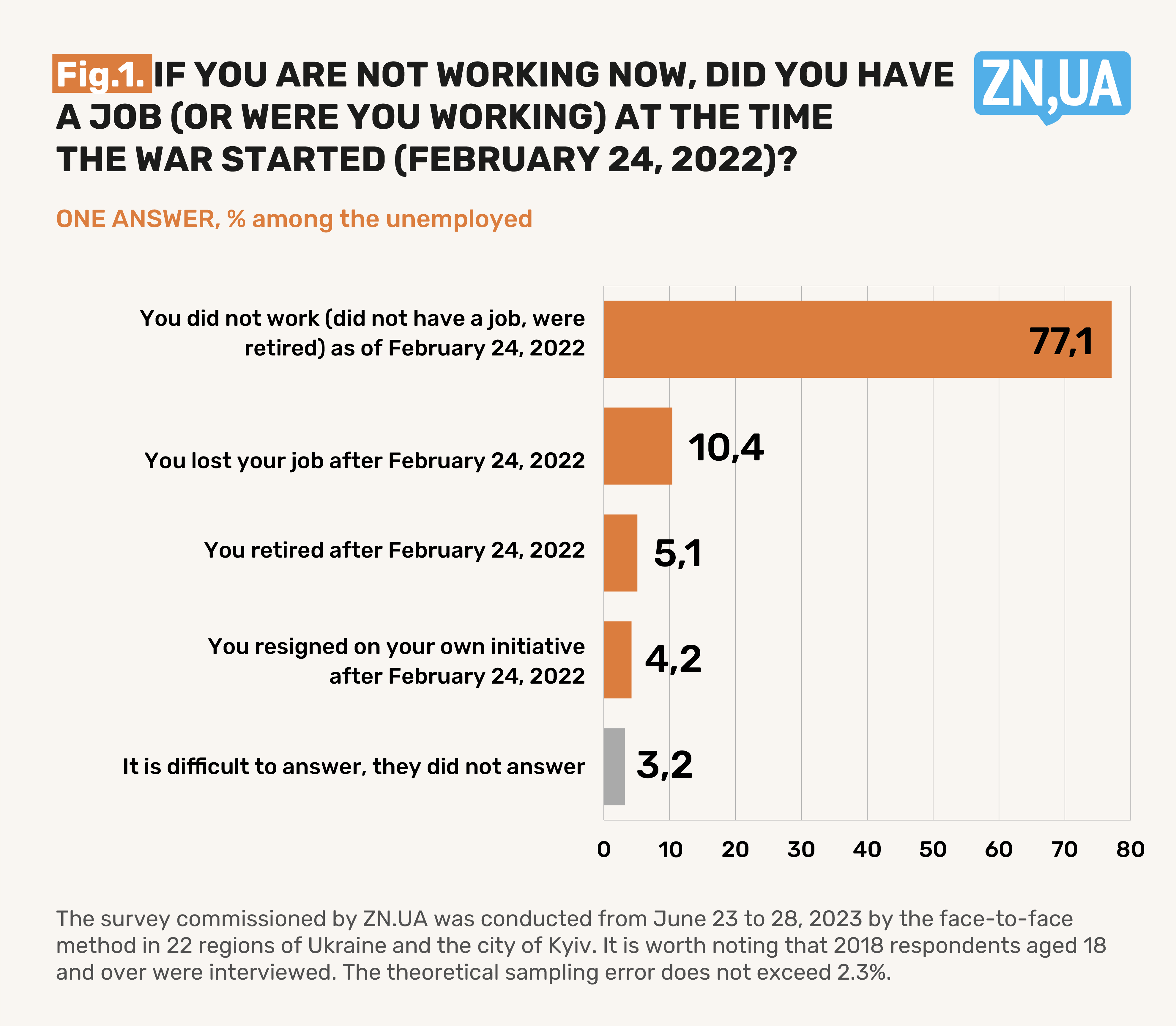
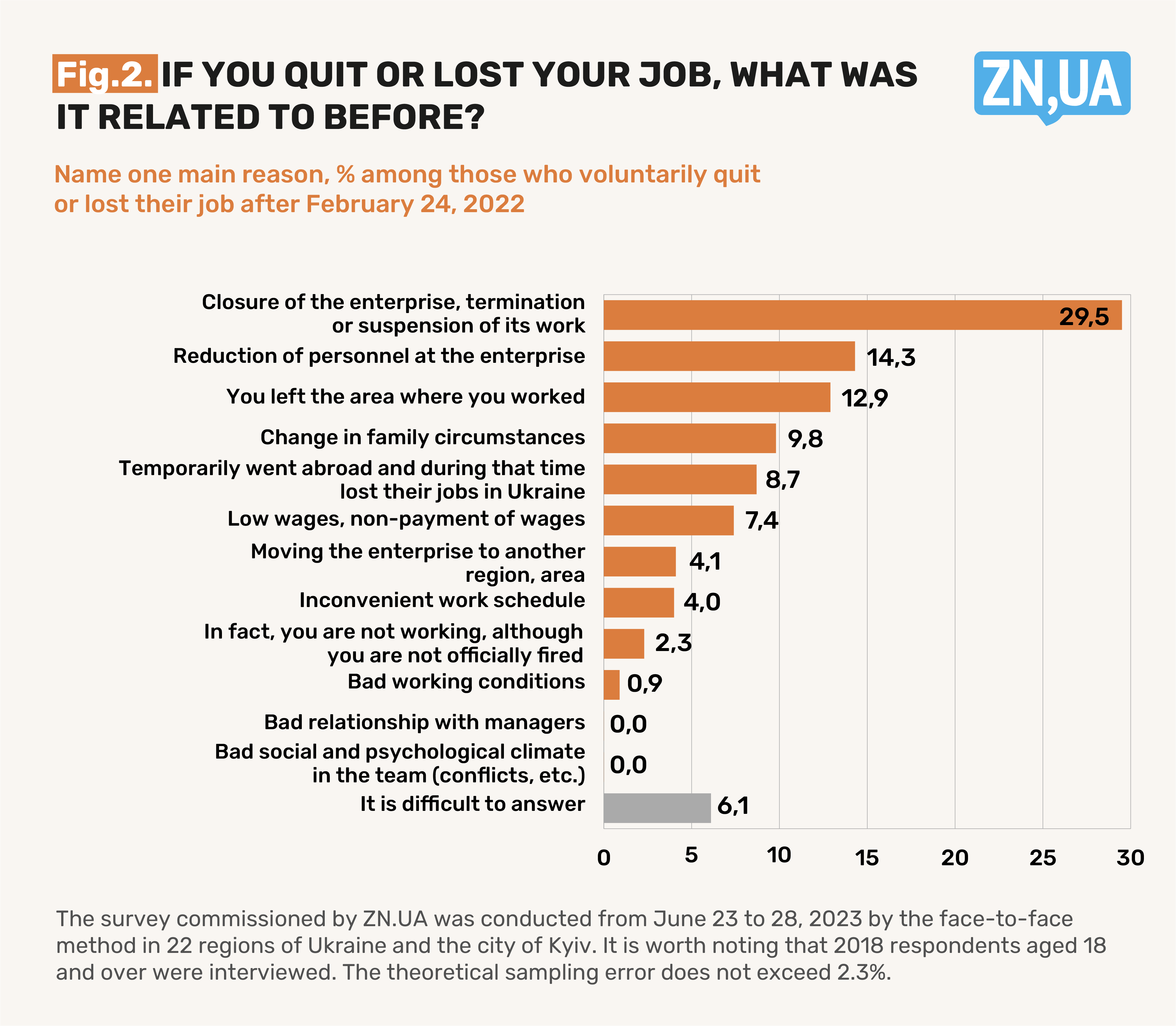
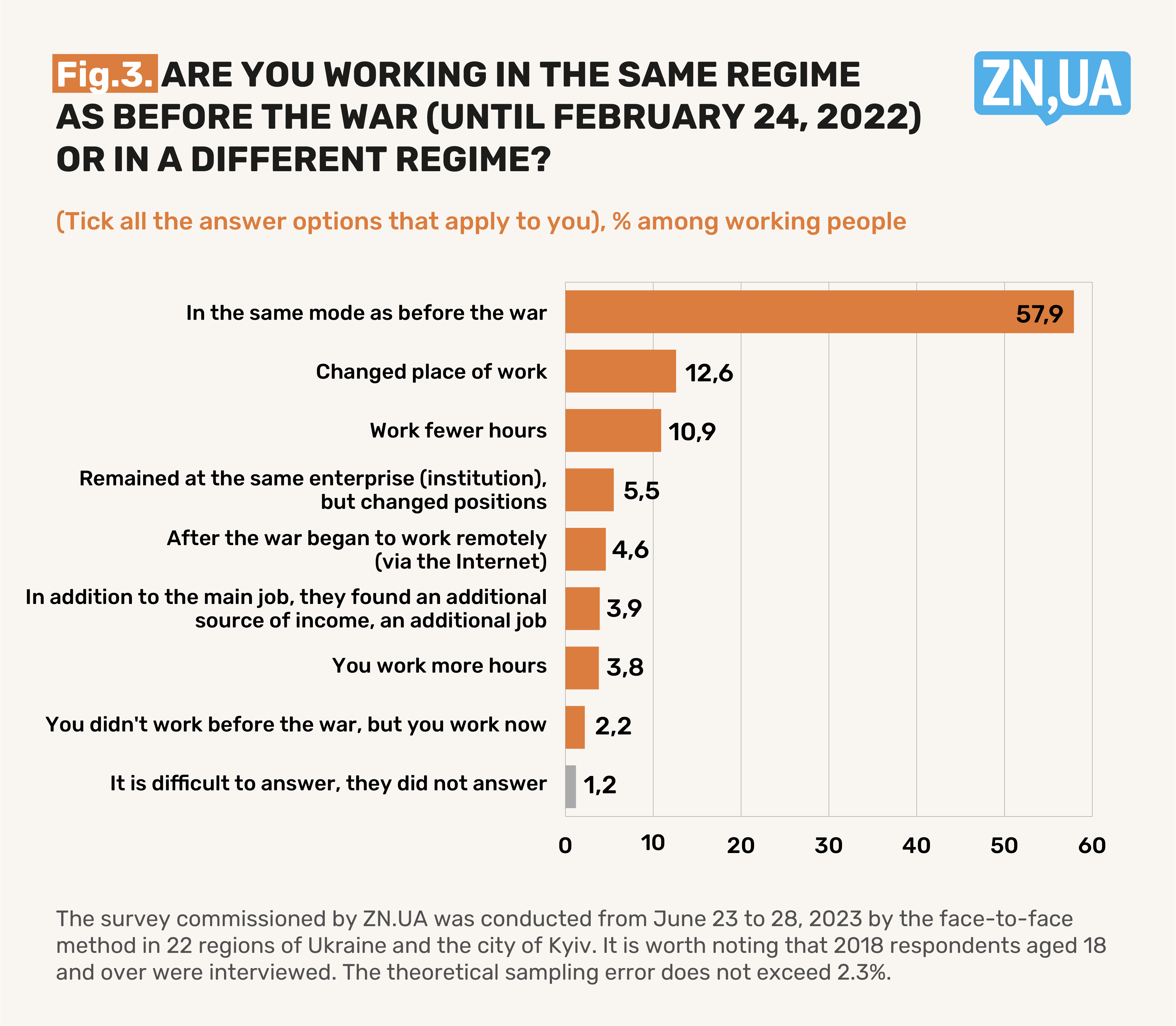
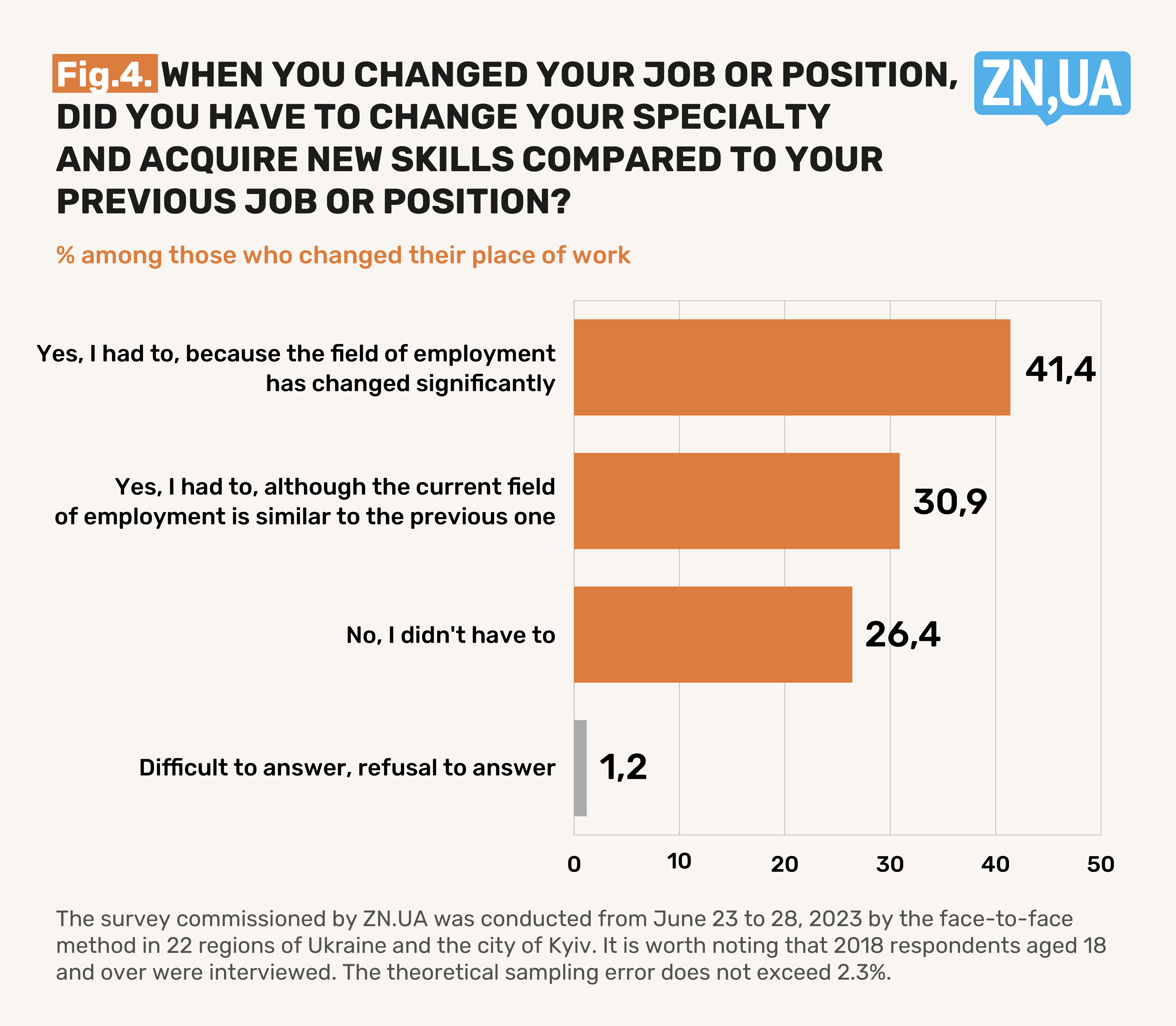
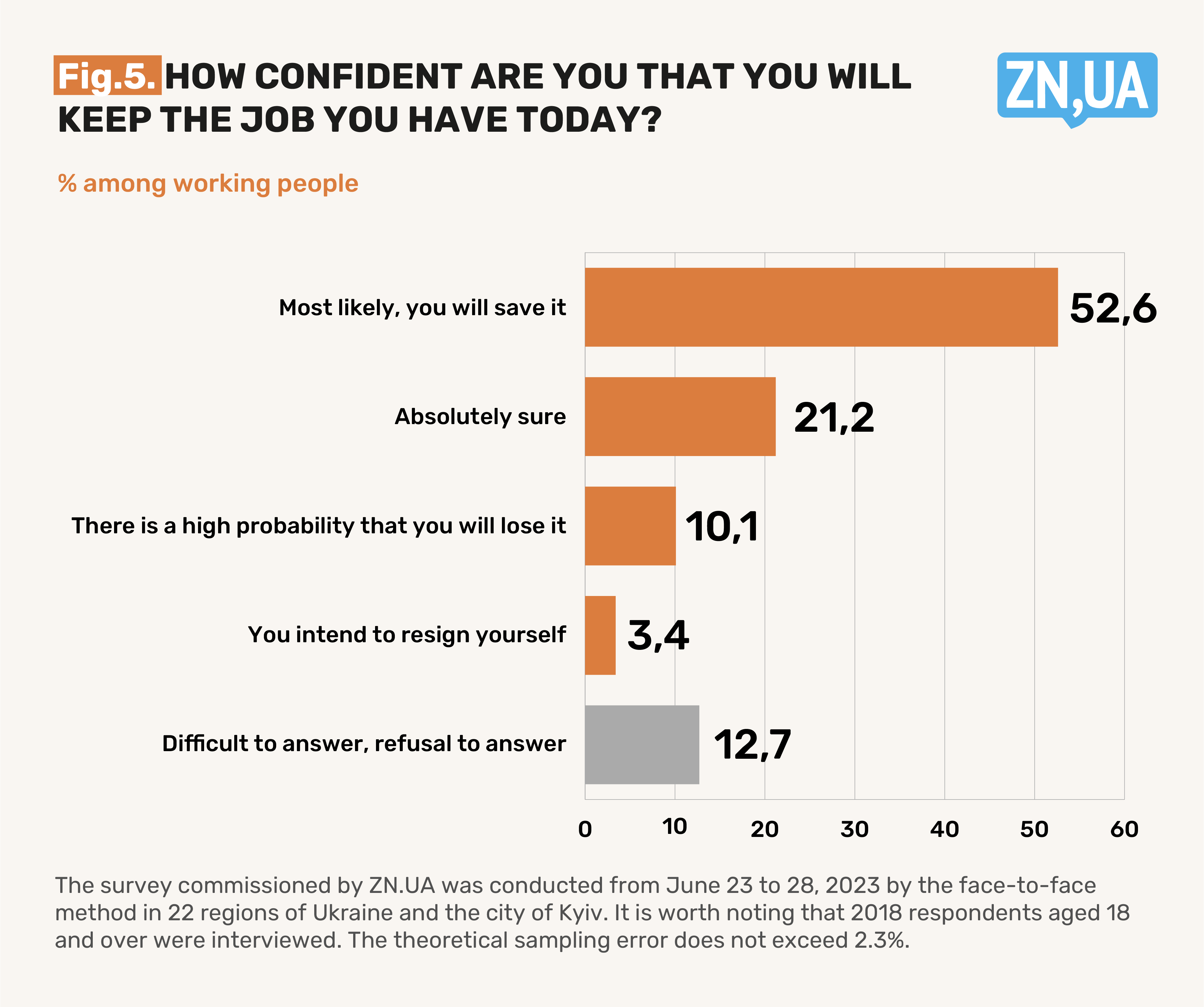

 Login with Google
Login with Google